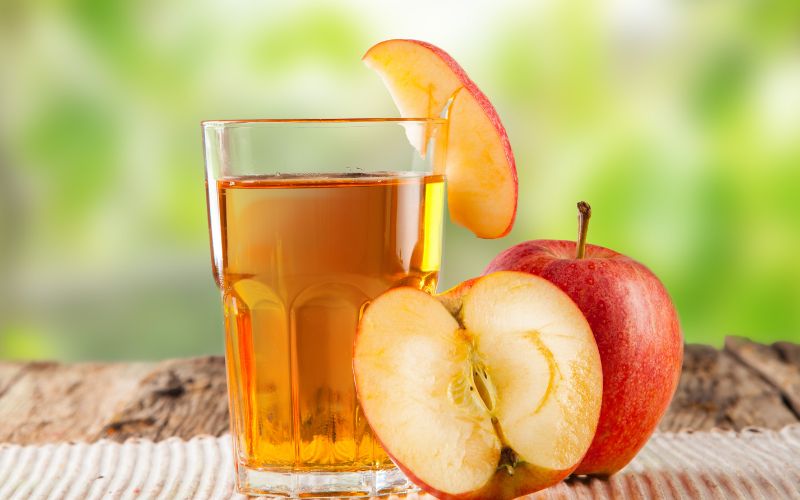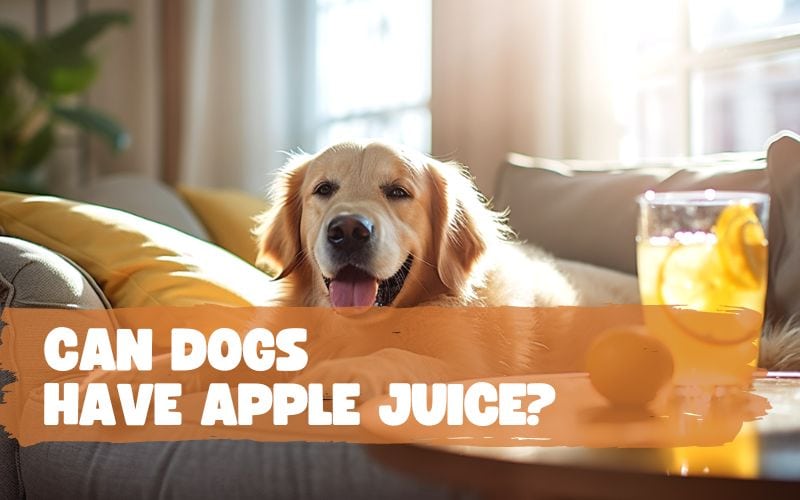Is sharing some refreshing apple juice with your furry friend okay? This is a question many dog owners wonder about, especially considering that apples are safe for dogs.
Apple juice is not safe for dogs due to the potential dangers of added sugars and xylitol, which can cause rapid weight gain, obesity, and diabetes.
Our article explores whether apple juice suits canine consumption and highlights the potential health benefits and risks.
Ready to find out if this sweet drink belongs in your pup’s bowl?”.
Key Takeaways
- Apple juice is unsafe for dogs due to the potential dangers of added sugars and xylitol.
- The high sugar content in apple juice can lead to rapid weight gain, obesity, and diabetes in dogs.
- Store-bought apple juices may contain chemical additives and concentrates that pose additional health risks for dogs.
- Xylitol, a sweetener in some commercial apple juices, is highly toxic to dogs and can cause low blood sugar levels or liver failure.
- Water is the best choice for keeping dogs properly hydrated, while safe fruits and vegetables such as blueberries, carrots, and watermelon can be given as treats.
Can Dogs Drink Apple Juice?
Apple juice is not safe for dogs to drink due to the potential dangers of added sugars and xylitol, making moderation and consultation with a veterinarian essential.

The potential dangers of apple juice for dogs
Dogs’ bodies are not designed to process the high sugar content in most commercial apple juices. Offering this sweet beverage to your pet could lead to rapid weight gain and related health issues like obesity or diabetes, significantly decreasing a dog’s quality of life.
Beyond contributing to excessive weight, the sugars can also trigger bouts of diarrhea – not ideal for either pup or owner!
More alarmingly, many store-bought apple juices contain chemical additives and concentrates, which pose additional health risks for dogs.
Distressing as it may be, every dog owner must understand these potential dangers before giving their furry friend apple juice.
The risks associated with added sugars and xylitol
Added sugars and xylitol are two main concerns when giving dogs apple juice. Most brands of apple juice sold in stores contain added sugars, which can be unhealthy for dogs and may lead to digestive issues such as diarrhea.
Dogs’ bodies are not designed to handle high amounts of sugar, so avoiding giving them juices with added sugars is essential.
Furthermore, some commercial apple juices may contain xylitol, a toxic dog sweetener. Xylitol can cause a sudden insulin release in a dog’s body, leading to low blood sugar levels or even liver failure.
Dog owners must check the ingredients list on any apple juice they consider giving their furry friends and ensure that it does not include xylitol.
To prioritize your dog’s health and well-being, it is best to stick with water as the primary source of hydration. Safer alternatives are available to offer your dog something fruity as a treat or flavor enhancer.
Stick with fresh fruits and vegetables safe for dogs, such as blueberries or carrots.
The importance of moderation and consultation with a veterinarian
To ensure the well-being of your furry friend, it is crucial to understand the importance of moderation and consultation with a veterinarian when considering giving apple juice to your dog.
While apple juice is not considered toxic to dogs, its high sugar content and acidity can pose risks if consumed excessively. Most store-bought apple juices contain added sugars and fruit juice concentrate, which are not healthy for dogs.
Consulting with your veterinarian will help determine if giving apple juice suits your dog’s specific needs and health condition. They can provide guidance on portion sizes and alternatives that may be better suited for hydration or as a treat for your canine companion.
Alternatives to Apple Juice for Dogs
Water is the best choice for hydration, but safe fruits and vegetables such as blueberries, carrots, and watermelon can also be given to dogs.
Water is the best choice for hydration
Water is the best choice when it comes to keeping your dog hydrated. It is essential for their overall health and well-being. Unlike other beverages, water contains no added sugars or harmful additives that can harm your furry friend’s health.
Dogs rely on water to regulate their body temperature, aid digestion, and transport nutrients. By consistently providing fresh and clean water, you ensure your dog stays appropriately hydrated and avoids potential health issues associated with other drinks like apple juice.
Safe fruits and vegetables for dogs to consume
There are several safe fruits and vegetables that dogs can enjoy as treats or additions to their meals. These include blueberries, strawberries, bananas, watermelon (seedless), cucumbers, carrots, and sweet potatoes.
These fruits and veggies provide essential vitamins and nutrients for your furry friend while being low in calories. Blueberries are rich in antioxidants that support overall health, while strawberries are packed with vitamin C.
Bananas offer potassium and fiber, while watermelon is hydrating on hot summer days. Carrots are crunchy snacks that promote dental health, and cucumbers provide a refreshing crunch without adding many calories.
Health Benefits and Risks of Apple Juice for Dogs
The potential benefits of apple juice for dogs
In moderation, Apple juice can benefit dogs due to its natural vitamins and antioxidants. It contains vitamin C, which supports the immune system and helps fight infections.
Additionally, apple juice is a good source of hydration for dogs who may not drink enough water. However, it is essential to note that the benefits are only present when giving dogs fresh apple juice without added sugars or xylitol.
The key here is moderation – too much apple juice can lead to digestive issues and weight gain due to its high sugar content.
It’s always best to consult your veterinarian before offering new treats or beverages to ensure they align with your dog’s health needs.
The risks of high acidity and sugar content
The high acidity and sugar content in apple juice can pose risks for dogs. Dogs have different digestive systems than humans, and the high acidity levels in apple juice can lead to stomach upset, including diarrhea.
Moreover, the sugar content in most store-bought apple juices is unhealthy for dogs and may contribute to obesity and other health issues.
Always prioritize your dog’s well-being by offering them a balanced diet that aligns with their specific nutritional needs.
Xylitol toxicity risk in certain commercial apple juices
Certain commercial apple juices may contain xylitol, a highly toxic dog sweetener. Xylitol can cause a rapid release of insulin in dogs, leading to dangerously low blood sugar levels, which can be life-threatening.
Even small amounts of xylitol can severely affect dogs, including liver damage and seizures. Dog owners must carefully read the labels of any apple juice they consider giving their pets and ensure it does not contain this harmful ingredient.
How to Safely Offer Apple Juice to Dogs
To safely offer apple juice to dogs, consider making homemade apple juice without added sugars or additives. Dilute the apple juice with water to reduce its acidity and sugar content before offering it as an occasional treat.
Go along to this article to discover more about the precautions and best practices for introducing apple juice into a dog’s diet.
Homemade apple juice Considerations and precautions
Making homemade apple juice for your dog can be a healthier alternative to store-bought options, but there are some important considerations and precautions to remember.
When preparing homemade apple juice for your dog, using fresh, organic apples that have been thoroughly washed to remove pesticides or chemicals is crucial.
Additionally, remember to remove the core and seeds as they contain small amounts of cyanide, which can be toxic to dogs. You can then blend or juice the apples without adding sugar or sweeteners.
Offering homemade apple juice in moderation as an occasional treat can be a refreshing and nutritious option for your furry friend.
However, always consult your veterinarian before introducing any new food or drink into your dog’s diet to ensure it aligns with their health needs.
Diluting apple juice with water for safe consumption
To offer apple juice to dogs in a safe manner, it is essential to dilute it with water. This helps reduce acidity and sugar content, making it a healthier option for your furry friend.
Ensure that you dilute the apple juice before giving it to your dog. Overconsumption of sugar can lead to obesity and other health issues for dogs.
Conclusion
It is not recommended to give dogs apple juice. While it may not be toxic, the added sugars and high acidity can harm their health.
Consult a veterinarian for safe hydration options for your pet. Remember, water is always the safest choice!
